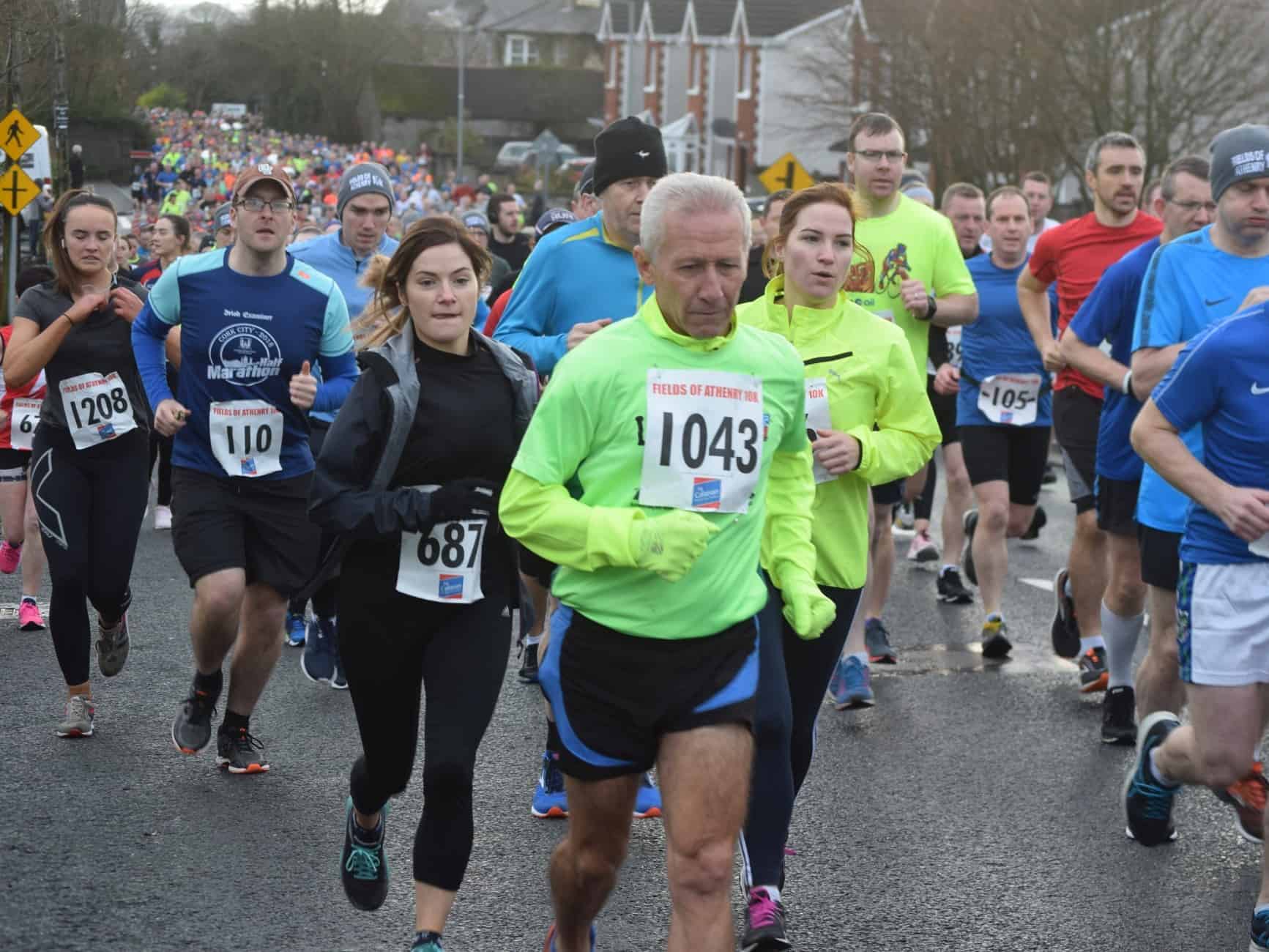Last updated on January 19th, 2023 at 03:38 pm
We all know that a good exercise regimen can reduce the risk of heart disease. But will it improve your longevity? As runners, we’re often looking for the path with the most health benefits. As such, modern research is now questioning do runners have a longer life expectancy.
While running can improve both the quality and quantity of your life, too much can actually be detrimental to your health. We’ll explore the reasons why.
Do marathon runners age faster
One of the widest-spread myths about marathon running is the idea that it makes you age faster. While marathon runners can certainly appear older, running itself is not actually the cause.
Furthermore, there are various ways to offset the effect of what is known as “runner’s face.” So, don’t let a myth keep you from one of the best forms of exercise out there.
What Causes Runner's Face
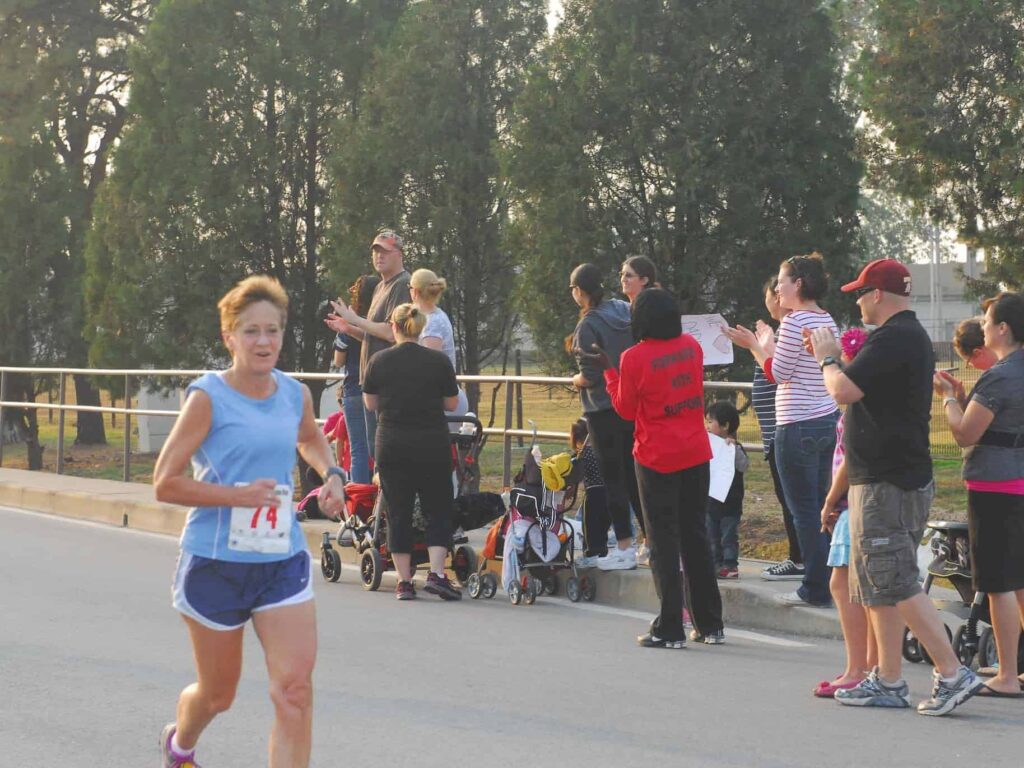
The real reason for ‘runner’s face’ is both the sun and gravity.
In fact, as you run, the jarring impact causes the skin to bounce up and down. And, we all know that the skin is elastic and that it loses its elasticity with age. However, the constant up-and-down motion of running also takes a toll over a period of time.
Just like a piece of elastic can become stretched beyond return, so can your skin. Plus, this is more prominent in lean runners who possess less body fat. The constant stretching more or less causes the skin to sag because it loses its elasticity.
In addition, prolonged exposure to the sun and harmful UV rays are also contributing factors to ageing. As with anyone who spends a great deal of time outside, the body’s collagen is depleted. Collagen is what keeps your skin elastic and looking youthful.
In essence, the more your skin is exposed to harmful elements, the more weathered it becomes. This is what gives the aged appearance.
Rest assured, however, there are things we can do to offset the loss of collagen:
- Stay hydrated
- Wear sunscreen
- Wear a hat
- Use moisturizers or body oils, particularly with Vitamin E
- Consume plenty of Vitamin C and antioxidants
Hydration is the key to everything in life, including fending off runner’s face. In fact, we list our favorite hydration options for marathon runners in our post Best Hydration Vests for Trail Running and Ultrarunning.
Overuse Injuries Appear to Add Age
Additionally, another reason that runners can appear to age faster is caused by “overuse injury.” As the name implies, it’s generally caused by overuse or repetitive trauma. The injury usually occurs in a muscle or tendon by not giving it sufficient time to rest and heal.
In most cases, these injuries result from:
- Trying to do too much too fast
- Running too long
- Improper technique
- Repetitive activities involving the same muscle group
- Natural ageing
- Poor running shoes
Particularly as a marathon runner, it is imperative to give your body enough time to heal following a long endurance run.
If you’re looking to better track your training and timed runs, check out our post on Best GPS Watches For Trail Running & Ultrarunning for a list of our favorite performers for the sport.
Furthermore, to avoid physical injury due to encroaching darkness, check out our Best Headlamps for Trail Running post.
Most common injuries for runners include:
- Stress fractures
- Shin splints
- Runner’s knee
- Achilles tendonitis
- Hamstring pulls
- Plantar fasciitis
- Iliotibial band syndrome
- Retropatellar or patellofemoral pain syndrome
Granted, overuse injuries are more likely to occur as runners become older. It’s common knowledge that ageing runners usually hit milestones around the age of 40, and again as they approach 70. This is because as the body ages, it naturally loses its muscle mass.
For this reason, it’s a good idea to incorporate strength training into your regimen to help offset the loss of muscle mass.
Additionally, runners should mix up their exercise routine and incorporate other modes of exercise besides running. This serves two purposes.
First, it allows the body sufficient time to rest and heal between runs.
Second, it also utilizes various muscle groups to prevent taxing any one single group.
Examples of other beneficial exercises include
- Cycling or ellipticals
- Swimming
- Circuit training
- Speed walking
- Aerobics
- Plyometrics
Most importantly, be sure to warm up properly before you perform any exercise. This is by far the best way to prevent injuries altogether.
Can Running Reduce Lifespan
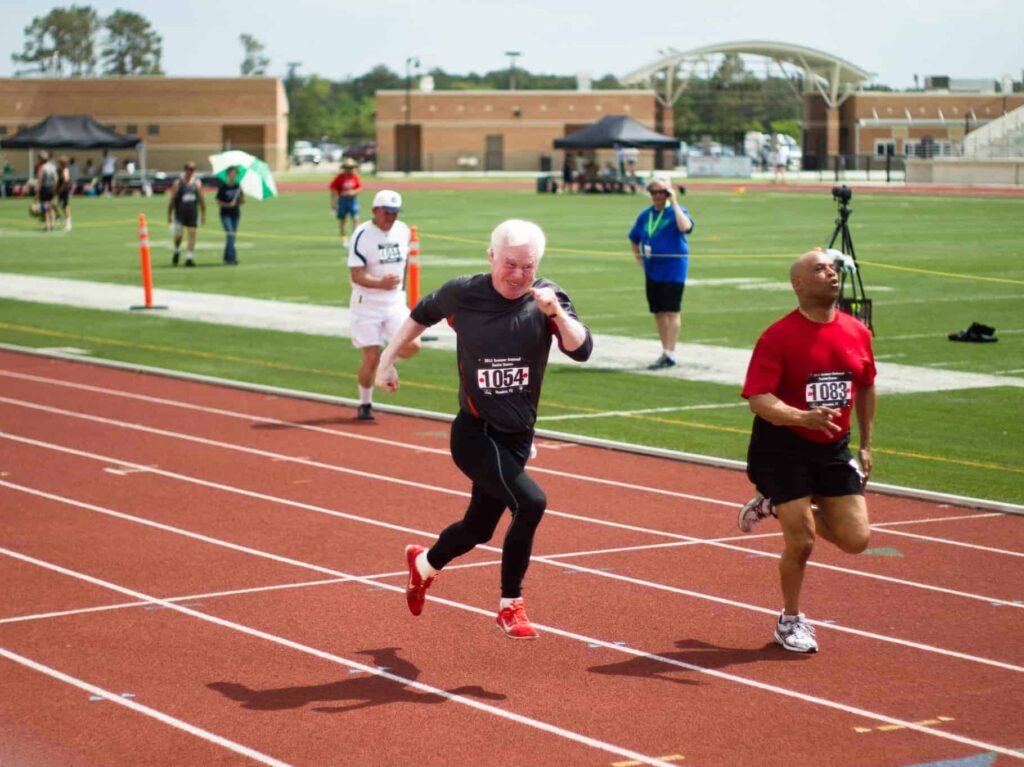
Contrary to the idea that runners live longer, newer research is beginning to question just how accurate that is. And it’s becoming evident that moderation is the key to running just like everything else in life.
Finding the sweet spot between too little and too much is essential to perpetuating longevity and reducing known risk factors.
Newer studies are beginning to show that too much strenuous activity is actually more harmful to your health than it is good.
In 2015, The Copenhagen City Heart Study revealed a few negative outcomes for “long-term strenuous endurance exercise.”
1) It can cause transient acute volume overload.
2) It can lead to patchy myocardial fibrosis.
3) It may be associated with calcification of the coronary arteries.
4) It can lead to wall stiffening of the coronary arteries.
Let’s break that down.
First, transient acute volume overload is an increase in extracellular fluid that typically occurs in heart and kidney failure.
Next, patchy myocardial fibrosis is usually seen in the late stages of cardiac disease and can lead to sudden cardiac death.
Lastly, coronary artery calcification is a build-up of calcium in the arteries that supply blood to the heart. It also increases the risk of a heart attack. It makes the arteries stiff and unable to expand and contract (source).
The fact that signs of cardiac disease are found in runners who push the limits is alarming, to say the least.
In conclusion, the study found that the mortality rate of strenuous joggers was really no different than that of the sedentary group.
Harvard Medical School suggests that running approximately 4 ½ hours per week could be that sweet spot runners are searching for. Their newest study reiterates that those who run more don’t necessarily live longer.
Do Runners Live Longer
We know that running has all sorts of proven benefits. In fact it’s one of the best cardiovascular exercises in existence. Furthermore, its most well-known benefit is reducing cardiovascular disease. Plus, it also improves your resting heart rate and can even help you sleep better at night.
So, it’s a logical assumption that anything good for your health has a high probability of helping you live longer. Even better, we have the evidence to show it.
The same Harvard study mentioned above reveals that running can reduce death by heart attack by up to 45%.
And you don’t have to be a marathon runner to achieve those results. The study shows that running as little as 10 minutes a day still netted visible results.
However, keep in mind the above precautions and stick to a manageable, healthy amount of running.
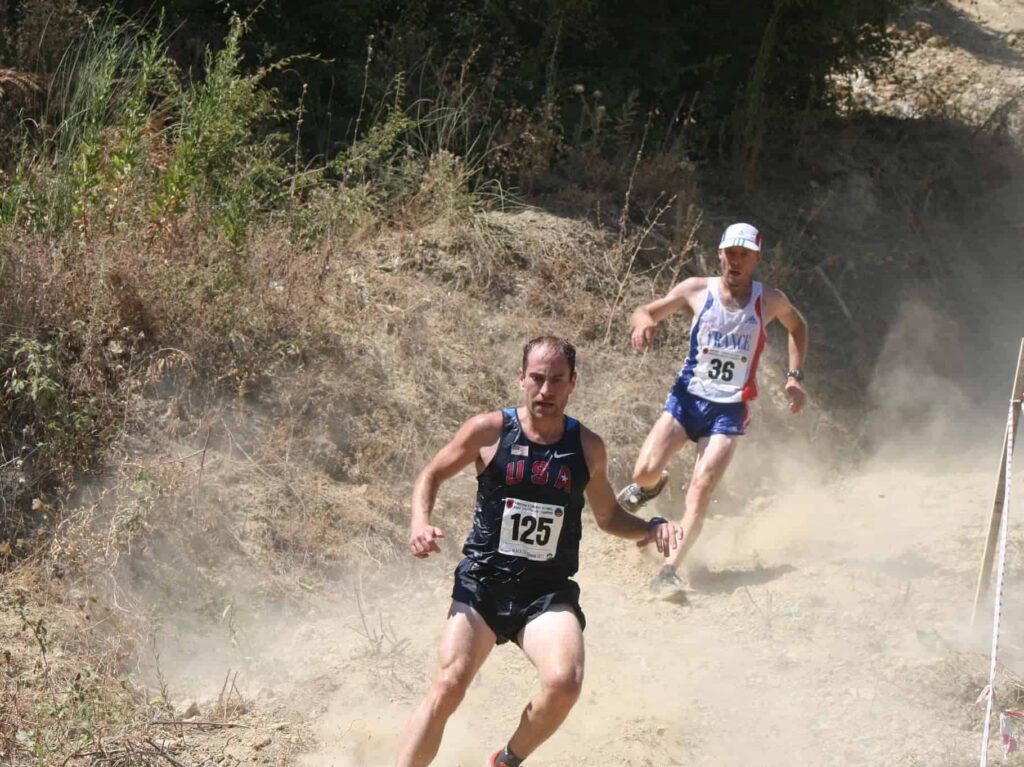
Can You Run Too Much
As mentioned earlier, running too much can actually cause more harm than good. In fact, the Ochsner Health System suggests runners limit themselves to twenty miles per week.
Anything exceeding that number actually decreases any advantageous health benefits (source).
Distance runners, in particular, appear to have higher rates of disabilities secondary to oxidative stress. Oxidative stress inhibits your immune system and increases free radicals.
Every runner has a threshold, so it’s important to know what yours is to prevent injuries. Any athlete will tell you it’s important to listen to your body.
Signs that you may be running too much include:
- Feeling weak
- Experiencing longer recovery times
- Increased illnesses
- Abrupt mood swings
- Constant fatigue
If you’re currently running more than twenty miles a week, you may want to rethink your regimen and consider making some adjustments.
What Athlete Lives Longest
Additionally, there’s much debate about which athletes live the longest, and obviously, there are many mitigating factors.
However, the forerunners include tennis, Olympic athletes, cyclists, swimmers, and runners.
In fact, the Melbourne School of Population Health followed more than 15,000 Olympic medalists for thirty years. Their study revealed that medalists lived 2.8 years longer than their control group within the study.
Additionally, a study on 786 Tour de France cyclists revealed a 41% lower mortality rate when compared to their control subjects (source).
Furthermore, the American Medical Association completed a study on VO2 max, which is the maximum amount of oxygen the body can take in. This study showed endurance athletes had a 42% lower risk of dying at a given age.
Overall, the conclusion was that if your body has to work harder to get oxygen, then you ultimately live longer.
Finally, according to the Copenhagen City Heart Study, the best by a landslide are tennis players, who live a whopping 9.7 years longer than other athletes.
The reasons why are only speculation, but deductive reasoning lends a lot to the equation.
First, athletes take exceptional care of their bodies. Plus, they avoid eating empty calories and things known to be toxic or cause inflammation to their bodies.
In addition, athletes make sure they get a proper amount of sleep, and they rest when they need to. As a result, they live exceptionally disciplined lives which means more years.
Furthermore, athletes make most decisions based on what’s best for their game. And their drive to win ensures that every action they take produces a favorable outcome for winning.
All of these things directly contribute to a healthier lifestyle, which inadvertently lends itself to a longer life.
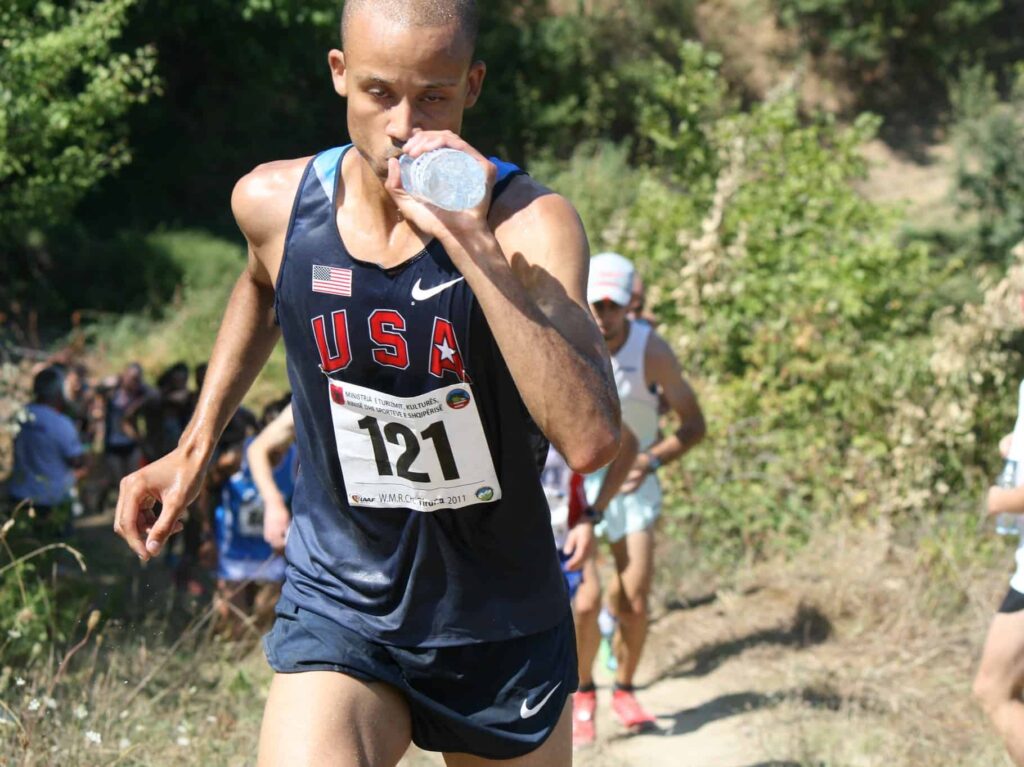
What is the Best Exercise to Live Longer
Finally, to understand the best exercises that will help us live longer, we must first understand the pillars that lay the foundation.
Creating a Balanced Fitness Plan
Physical fitness is typically broken into four distinct categories:
- Endurance. Endurance exercises are those that get your heart rate going. They also improve your lung health and circulatory system, as well as help reduce disease within the body. Endurance is the key piece that adds longevity to your life, but it’s not the only piece.
- Strength. Conversely, strength training improves your overall body strength, and when done correctly, reduces your chance of injury. Keeping a strong core is paramount to avoiding injuries, especially as we age. Strength training is performed with weights, resistance bands, or even your body. For example, simple push-ups, pull-ups, and sit-ups are all great ways to strengthen muscles without any additional equipment.
- Balance. Then there’s balance, which prevents falls and accidents. Good balance makes you a better athlete, period. Maintaining the body’s center of mass is essential in just about everything we do. Balance is especially important as your body tires.
- Flexibility. Finally, flexibility keeps you mobile especially as you get older. A better range of motion keeps you on your feet and in the game. Losing flexibility leads to a more sedentary lifestyle, which results in a shorter life span.
Furthermore, there’s a symbiotic nature between physical balance and mental health. Have you ever noticed how all of your meditation exercises like yoga, tai chi, and pilates all center around balance?
They’re not just designed for your physical balance, but your mental balance as well. You’re equally balancing your body, mind, and spirit.
Thus, the best exercise regimen incorporates all four of these components. There’s no one-size-fits-all exercise that’s better than another. Since interest and motivation also play a critical role, the key is to pick something you enjoy doing.

The Best Exercise for Longevity
Many exercise regimens naturally incorporate all four pillars, and running is certainly up there in the five.
A solid exercise routine increases energy, helps you sleep better, and reduces stress and anxiety. Moreover, a quality exercise program helps you maintain healthy body weight, control your blood pressure, and even reduce depression.
All of which inadvertently help you live longer.
The US Department of Health and Human Services suggests at least 1 hour 15 minutes of vigorous aerobic activity per week. Alternatively, you could opt for approximately 2 ½ hours of moderate aerobic activity.
In addition, they recommend strength training at least twice a week incorporating all major muscle groups with 12-15 reps each.
Furthermore, as previously mentioned, tennis is a great choice for a long life. However, be sure to start out easy, stretch, and hydrate to avoid overuse injury.
Running For Your Life
Running in conjunction with strength training is one of the best ways to add years to your life. Just be sure to stay between the lines of too little and too much.
Listen to your body, protect your skin, and stay hydrated. Running not only boosts your overall health, but it also boosts your longevity. So get out there in a great pair of running shoes and live longer.
About the Author
Sarah Sampsell
RELATED POSTS:
- Best Massage Gun for Athletes
- Best Gifts for Trail Runners
- 6 Best Waterproof Running Jackets for Trail Running
- Best Women’s Trail Running Shoes
- Best Hydration Running Belts for Ultrarunning
- GPS Watches With The Longest Battery Life
- Best GPS Watches For Trail Running & Ultrarunning
- Best Headlamps for Trail Running
Title Image Credit, Do Runners Have a Longer Life Expectancy: Peter Mooney | (source) | Attribution 2.0 Generic (CC BY 2.0) — reduced file size and image
Do Runners Have a Longer Life Expectancy, Image Credit 1: USAG- Humphreys | (source) | Attribution 2.0 Generic (CC BY 2.0) — reduced file size and image
Do Runners Have a Longer Life Expectancy, Image Credit 2: Michael Dougherty | (source) | Attribution-ShareAlike 2.0 Generic (CC BY-SA 2.0) — reduced file size and image
Image Credit 3, Do Runners Have a Longer Life Expectancy: Gerry Brady | (source) | Attribution-NoDerivs 2.0 Generic (CC BY-ND 2.0) — reduced file size and image
Do Runners Have a Longer Life Expectancy, Image Credit 4: Gerry Brady | (source) | Attribution-NoDerivs 2.0 Genereic (CC BY-ND 2.0) — reduced file size and image
Image Credit 4, Do Runners Have a Longer Life Expectancy: Steven Pisano | (source) | Attribution 2.0 Genereic (CC BY 2.0) — reduced file size and image

